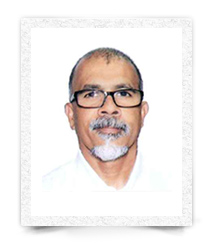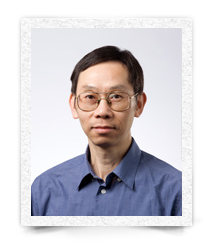


Keynote Addresses
Sharing from excellent teachers in CUHK
| Dr Wing Hung Wong
Nominee of University Grants Committee Teaching Award 2011 Associate Director Deputy Director |
 |
|
Title Diascopic-Science Approach to Teaching General-Education Science Abstract Many people have an impression that general-education science is the same as popular science. This impression is not wrong, but it is not correct either. In this talk, I shall propose ‘Diascopic Science’ as a new genre of science in contrast to such traditional genres as frontier science for researchers, technical science for academics and popular science for laymen. I shall also propose diascopic science as a model of teaching general-education science. Diascopic science aims to provide a scientific perspective on various aspects of intellectual concern; namely, nature, society, self and our cultural heritage. The aspect of nature is more science-related and the other three are usually categorised as non-science. Hence, on the one hand, diascopic science has a resemblance to traditional genres in that it is about science. On the other hand, it is not like traditional genres in that it also aims to provide a scientific understanding of non-science. However, even if it is about science, its emphasis is not on scientific applications but implications, and the focus is not on the subject matter of science but the scientific methodology beneath the subject matter. Diascopic-science approach is not new at CUHK. It has already been adopted in some general-education courses. It is well received by both science-major and non-science-major students. The approach has proven to be effective in broadening their horizons beyond and also within their major studies. Examples of this will be introduced in the talk. Biography Dr Wing Hung Wong is the Associate Director of the University’s General Education Programme and Deputy Director of the General Education Foundation (GEF) Programme. He initially joined the Department of Physics in 1996. In 2009 when a core team was being assembled to design, pilot and implement the GEF Programme for the new curriculum to all new students starting from 2012, he was transferred to the Office of General Education. Dr Wong received his B.Sc., M. Phil. and Ph.D. degrees in Physics from the Chinese University of Hong Kong in 1991, 1993 and 1996, respectively. He has a deep interest in theology. In 2004, he was awarded a Master’s degree in Christian Studies by the Lutheran Theological Seminary. His academic interests include theoretical physics, general education and the dialogue between science and religion. The GEF Programme consists of two courses; namely In Dialogue with Humanity and In Dialogue with Nature (now affectionately known as DIANA), for which Dr Wong is responsible. The GEF Programme has been piloted several times, receiving very positive feedback from the students. The programme is seminar-based. More than 3500 students are divided into about 150 small groups of 25. The greatest challenge the programme is facing is building up a strong team of 27 teachers. Dr Wong has contributed a great deal to the general education of CUHK since he taught in the Department of Physics. Apart from course development, he has also great involvement in general education activities beyond the classroom, such as giving talks and writing books on popular science. Dr Wong was awarded the first Exemplary Teaching Award in General Education in 2006. In 2008, he was granted the Vice Chancellor Exemplary Teaching Award. In 2011, he was one of the two CUHK nominees for the University Grants Committee Teaching Award. |
|
| Prof. Shekhar Madhukar Kumta
Awardee of University Grants Committee Teaching Award 2012 Professor
|
 |
|
Title Using ‘Mastery’ to Motivate and Facilitate Student Learning Abstract In this presentation I want to move beyond the widely held belief that assessment alone drives learning. Humans in general are driven by necessity. Students’ motivation to learn may perhaps be enhanced if it can help them understand this necessity. The sense of mastery develops in early childhood and is an important factor in determining self-regulation in the child. We may utilise this innate need to acquire mastery in what is being learned to motivate and empower student learning. I would like to share my experience of teaching medical students in their clinical and pre-professional years, during which I have developed learning resources that enable students to acquire mastery in some of the common tasks expected of them as interns (junior doctors). Even at a very early stage of their learning (pre-clinical years) students learn better when the contextual importance of what is being learned is made explicit. By understanding how their acquisition of mastery is likely to affect the lives of others, students find inspiration and are motivated to learn. My presentation explores the many ways in which we may harness this innate sense, so as to improve the learning experience. Biography Prof. Shekhar Madhukar Kumta, Assistant Dean (Education), Faculty of Medicine, and Professor in the Department of Orthopaedics and Traumatology at The Chinese University of Hong Kong (CUHK), is presented with a 2012 University Grants Committee Award for Teaching Excellence by the University Grants Committee (UGC), in recognition of his outstanding teaching performance and achievements. It is the second time that a CUHK professor has received this honour since the award scheme commenced last year. Prof. Joseph J.Y. Sung, Vice-Chancellor of CUHK, said, 'I heartily congratulate Professor Kumta for garnering the "UGC Award for Teaching Excellence." This is a manifestation of our teachers’ commitment to promoting quality teaching and learning by receiving the recognition two years in a row. Having joined CUHK over a quarter of a century ago, Professor Kumta has been working very hard to develop and promote various innovative teaching and learning platforms and tools which have been widely adopted both inside and outside Hong Kong, and in the process have brought significant improvement to teaching standards in the medical disciplines. His passion for teaching is exemplary for many teachers and has motivated many of his peers to continuous improvement as they seek to fulfill the University’s primary mission of instilling knowledge into young people of promise, and to nurture and equip them to become responsible citizens.' Prof. Kumta feels deeply honoured to receive this award. He states: 'My sincere thanks to my colleagues and mentors at CUHK for their years of trust and support. I consider it a privilege to be given the opportunity to teach, for teaching comes with responsibility. What we teach and the way we teach will touch the lives of countless others. I am deeply grateful to all my students for their patience and tolerance, their enthusiasm, their keen sense of enquiry, and, above all, for having placed their deep trust in me.' Prof. Kumta continues: 'I intend to utilise the UGC's award towards the cost-effective development and pedagogically sound application of mobile learning technology in the delivery of healthcare and health sciences education through a series of workshops which are open to all tertiary institutions.' |
|
| Prof. Ming Chung Chu
Nominee of University Grants Committee Teaching Award 2012 Professor |
 |
|
Title Some Experience in Experiential Learning Programmes Abstract Students learn best when they are put in situations where they are forced to think and learn actively. I will discuss four non-credit bearing student-centred learning programmes organised for physics students, which put students into roles of researchers and/or teachers. These programmes help to promote a proactive academic culture in the department, and an unusually high percentage of students continue on in the academic fields after completing them. Biography Prof. Ming Chung Chu obtained his BSc and PhD in Physics from Caltech, in the years 1983 and 1987 respectively. Prof. Chu joined CUHK’s Department of Physics in 1995, and has been teaching both physics and general education courses for the past 17 years. He has served as the general education coordinator as well as a member of the Teaching and Curriculum Committee of the department since 1996, a member of the Senate Committee on General Education (as a representative of Dean of Science) since 2001, and the chairman of the Teaching and Curriculum Committee of the department from 2008 till 2012. Prof. Chu has also been a member of the Task Force for developing General Education Foundation Courses since 2008. His current research area is in elementary particle physics and cosmology. Prof. Chu strongly believes that students learn best when they are put in situations where they are forced to think and learn actively. This forms the common theme in the various teaching activities he has undertaken. Prof. Chu always prepares his lectures by thinking of how to stimulate the students into thinking. This means rather than making things easy, materials should be interesting but challenging, even for his general education courses and popular science talks. Prof. Chu has designed and implemented several student-centred experiential learning programmes for students with different interests, aspirations and capabilities, but they all share the common features through which participants are required to apply to what they have learned and learn what they need, gain perspectives not possible from traditional courses, and share their experience with other fellow students. |
|


